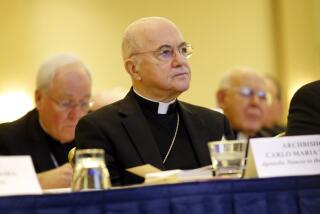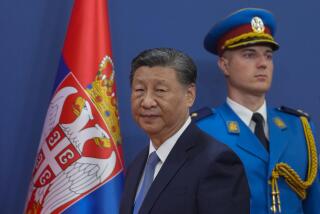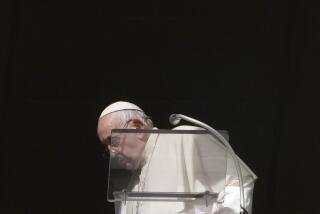Papal Trip Ends; Chill From Reception Lingers : Pontiff Firm in Conservatism; Reconciliation With Critics Seems Difficult
BIERCEST, Belgium — Pope John Paul II ended his Benelux pilgrimage here Tuesday the same way he began it 11 days earlier in the Netherlands--under heavy fire for his political and moral conservatism.
Continuing a pattern of open challenge that has differed only in its degree of boldness during the pontiff’s 23-city journey, a student leader at Louvain la Neuve, the world’s oldest Roman Catholic university and a leading theological center, confronted him on the issues of birth control and liberation theology.
“We are upset to know that the use of contraceptives can place couples outside the church,” said student body President Veronique Oruba in surprise remarks preceding John Paul’s address to thousands of faculty members, students and townspeople on the campus.
Justice, Liberty
As the pontiff vexedly scratched his head, Oruba, who like the Pope is of Polish extraction, added, “Your position with regard to the Latin American people and the theology of liberation surprises us.”
Then she pointedly continued:
“We think that Nicaragua, like Poland, El Salvador and Chile, are countries where the people are striving to apply the principles to which the church is fundamentally attached--the principles of justice and of liberty, of democracy and of respect for the rights of men.”
She praised Dom Helder Camara, a retired Brazilian archbishop and lifelong champion of the poor. “For us, he represents a true witness of theology,” Oruba said. “We would like the universal church to commit itself more radically, recognizing without reserve liberation theology, which itself is a witness of the Gospel.”
The church has strongly criticized what it calls the Marxist elements of liberation theology, which holds that the Bible justifies radical social action.
As he has throughout the three-nation trip, even when chided by leading Catholics such as Netherlands Prime Minister Ruud Lubbers, John Paul avoided a direct response and replied in broad generalities underlining the duty of Roman Catholics to obey the teachings of the church.
Various Experiments
“Today there are a number of new questions being raised, particularly in the field of ethics,” the Pope said. “Various experiments are taking place throughout the world, including the area of human life. Moreover, some of our contemporaries do not appear to understand fully the requirements of the church concerning their family life or social life.”
The duty of Catholic theologians and intellectuals in the confused modern world, he said, is to enlighten such people “in perfect harmony with the clear statements of the church in matters of faith and morals.”
Summarizing his sometimes-turbulent 11 days in the Netherlands, Luxembourg and Belgium, where liberalizing influences in sexuality, feminism and theology have clashed fiercely with his kind of orthodoxy, the pontiff made plain that he did not visit the Benelux countries to debate new issues with his challengers.
“To every group I’ve given the message I thought to be appropriate, not to reveal new things, but to strengthen its faith, to give a new impetus of hope, to stimulate and broaden charity . . . as a witness of the universal church.”
Pope Not Surprised
It was clear that the unprecedentedly bold questioning of his conservatism, particularly in Holland, where it sometimes reached the point of rudeness, and in Belgium, where it was more polite but no less comprehensive, did not surprise the traveling Pope.
Vatican officials said he knew weeks ago, when public opinion polls showed people to be largely unwelcoming and even hostile to receiving him, especially in Holland, that he would face direct challenges and perhaps even violence.
Even the content of most of the critical speeches delivered in his presence during the trip by confrontational Catholics was known to the Pope long before he left Rome for, in accord with long-standing practice, they had to be submitted in advance. Only a few of the speakers, such as Oruba, inserted stronger challenges to take the Pope by surprise after their texts had been approved.
One of the boldest was Hedwig Wasser, a leading figure in Dutch literary organizations and mother of three, who asked the Pope in Utrecht, Netherlands, if the church could remain credible when “we exclude rather than make room for unmarried people living together, divorced people, homosexuals, married priests and women.”
And Lubbers reminded the Pope that “Rome seems a very long way from here; indeed, to be quite frank, simply the word Rome makes some people uneasy if not downright suspicious.”
The pontiff stayed cool throughout the journey despite the criticism and appeared deliberately to avoid making provocative remarks, even deleting from his prepared speeches some passages that Protestant and Catholic dissidents might find unpalatable. But he was blunt in assuring them that his position on fundamental issues of human sexuality and church practices remains unalterably orthodox.
Stand Unchanged
The stand of the Roman Catholic Church against abortion, divorce, premarital sex and homosexuality is final and will “remain the standard of the church for all time,” he said in Amersfoort, Netherlands.
“The witness of Holy Scripture and a tradition of nearly 2,000 years (excludes) the ordination of women to the ministry of the priesthood,” he wrote in remarks released to an ecumenical meeting in Utrecht.
The question of why he chose to make the trip in the face of certain and widespread opposition is an easier one to answer than that of what the troubled visit accomplished for the church and for him.
Vatican officials said he hoped that by visiting the Benelux Catholics, who are the most liberal and divided in Europe, he might begin a process of reconciliation both with Rome and among themselves.
Neither Dutch nor Belgian Catholics felt that he succeeded, if one is to judge from random interviews after his appearances.
Long-Range Effects
But some expressed a fear that his failure to restore the beginnings of unity under his authority may have an impact far beyond the borders of the Benelux countries.
“This trip could have a domino effect and embolden liberal Catholics elsewhere, especially Europe and the United States, to speak out against the Pope and his traditional views,” said one member of the entourage that accompanied the Pope.
To the pontiff, who has become accustomed during his 6 1/2-year papacy to automatic adulation and deference as well as to wildly enthusiastic audiences of many thousands of people all over the globe, this first concerted open opposition may sting for a long time to come.
More to Read
Sign up for Essential California
The most important California stories and recommendations in your inbox every morning.
You may occasionally receive promotional content from the Los Angeles Times.










